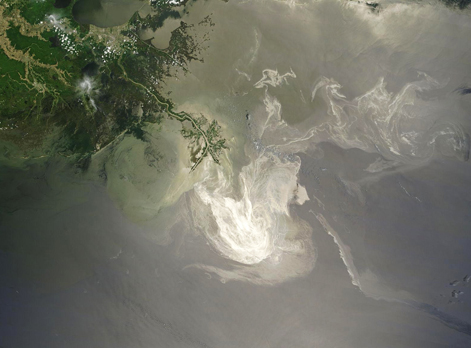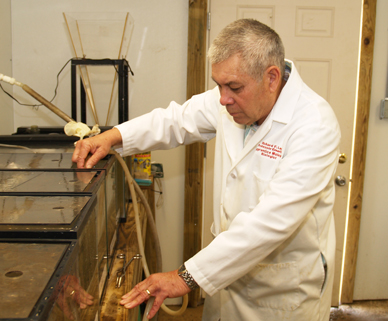The 2010 Deepwater Horizon oil spill in the Gulf of Mexico is the impetus behind a research project at the Skidaway Institute of Oceanography to study the effects of spilled oil on blue crabs and grass shrimp.

The Deepwater Horizon oil spill as viewed from space./ NASA Photo
The project is looking at two forms of oil. The first, emulsified oil, is an oil-water mixture produced by wave turbulence. The oil doesn’t change chemically, but the emulsification produces a thicker, more viscous mixture.
“Because the emulsified oil is so much thicker, it becomes a much more difficult clean-up issue, especially if it is washed ashore,” said Skidaway Institute professor Richard Lee, the chief scientist on the project.
Lee and his team are exposing blue crabs and grass shrimp to emulsified oil in sediment and then watching to see how this affects their molting, which is the way the shrimp and crabs grow.
The second focus is on oil that has been treated with dispersants. In the case of the Deepwater Horizon spill, millions of gallons of chemical dispersants were sprayed over the surface of the Gulf to disperse the oil slick. These break the oil down into micro-droplets. Dispersed oil forms a underwater plume that can extend for many miles.

Richard Lee works with the tanks containing crabs and grass shrimp in his laboratory at Skidaway Institute of Oceanography.
In the laboratory, the researchers are adding emulsified oil into the tanks containing the crabs and also feeding the crabs squid that has been contaminated by the emulsified oil. Dispersed oil droplets are added to tanks containing embryos of crabs and shrimp.
“What we are trying to determine here is just how the exposure to dispersed or emulsified oil affects the growth and molting crabs and shrimp,” said Lee.
The scientists selected grass shrimp and blue crabs for the study because of the important places they occupy in the marine food web. Although grass shrimp are not typically harvested as a commercial product, they are abundant in salt marshes and estuaries, and are an important food source for many fish. Blue crabs are also a food source for many fish in addition to having value as a commercial catch.
The study is funded by a $500,000 grant from the Environmental Protection Agency.
Lee is working with research associate Karrie Bulski at Skidaway Institute. The team also includes Sook Chung from the institute of Marine and Environmental Technology at the University of Maryland, and Harriet Perry and Christopher Snyder from the University of Southern Mississippi’s Gulf Coast Research Laboratory.
Sook is looking at the crab and shrimp at a molecular level. “We believe that the genes that regulate molting will be affected, and the crab and shrimp will not molt properly,” said Lee. “Hormone regulation and its relationship to contaminant exposure is something we need to learn more about, and Dr. Sook carries out that kind of research.”
The researchers will also send tissue samples, primarily from the shrimp and crab’s endocrine organs, to another researcher, Anna Walker, at Mercer University School of Medicine to look for physiological or pathological changes.
Another major part of the project will be to explain the results of the study to the public, especially the fishermen whose livelihood depends on a healthy marine ecosystem. A significant part of the grant, $80,000, is designated for the establishment and implementation of a Community Outreach for Accurate Science Translation teams in four communities along the north central Gulf of Mexico coast.
“This is primary role for the team from the University of Southern Mississippi,” said Lee. “They will develop public presentations on the project and the results to educate them on what this all means to them.”
The project will run through 2013.


